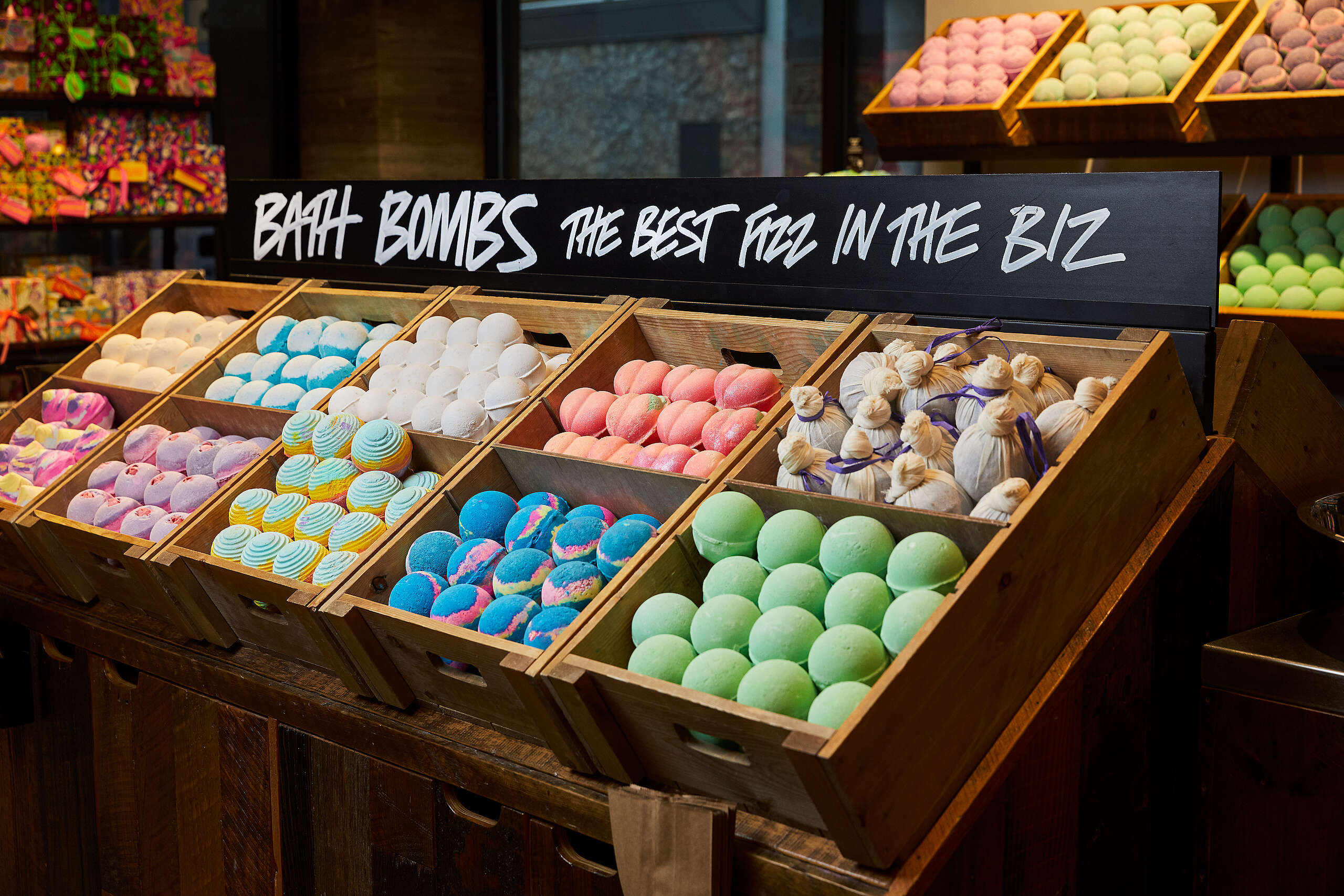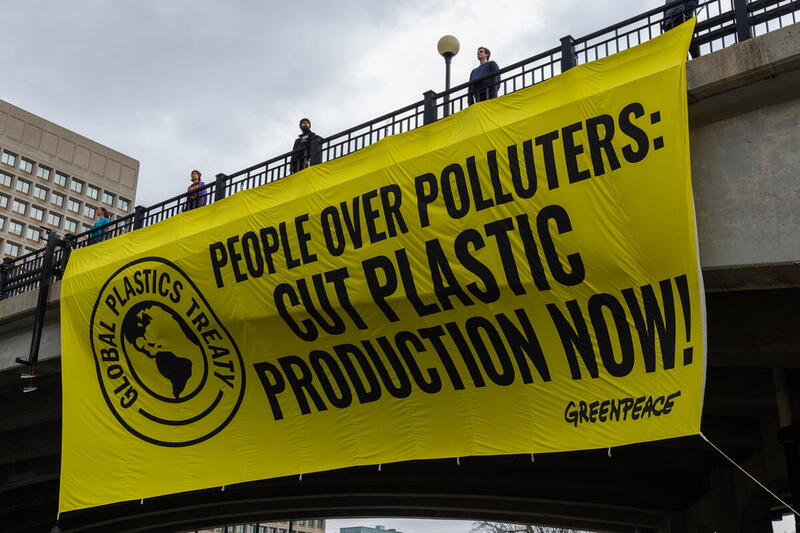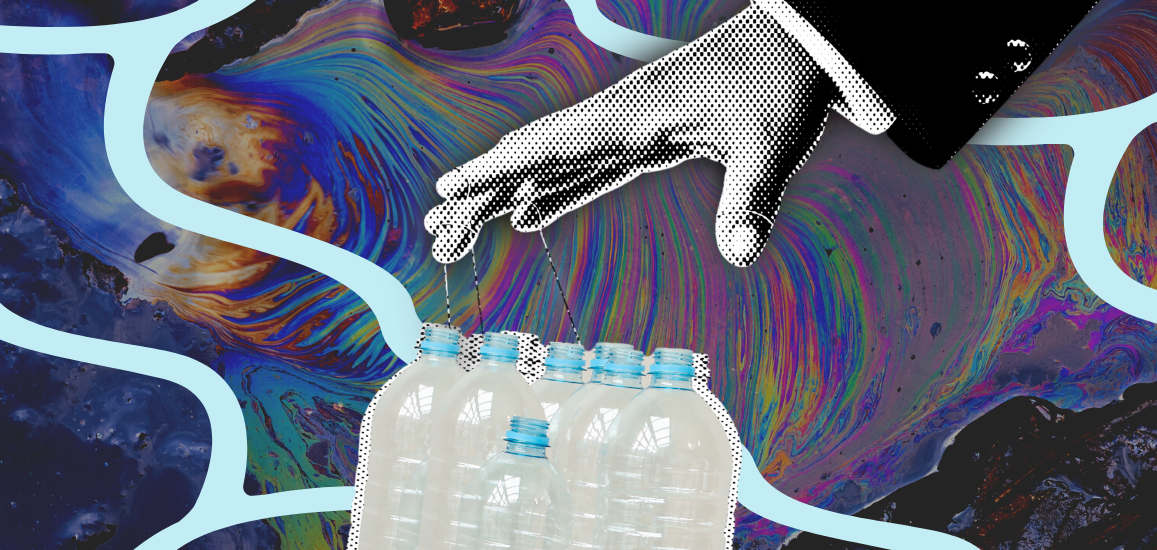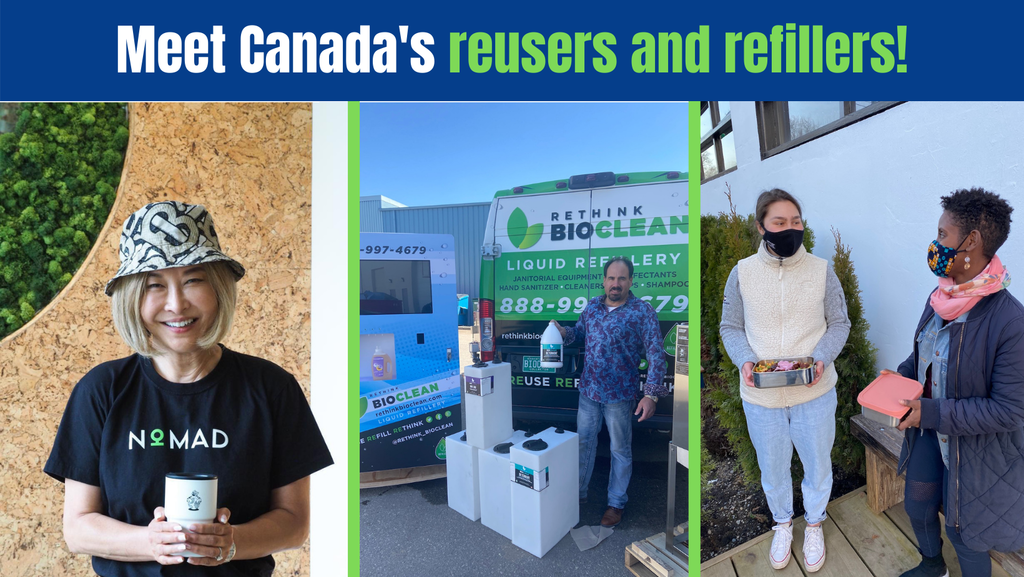
In Part One of this series, we brought you the stories of the owners of three reuse and refill shops: what inspired them to launch their business, how it’s going thus far, and what impact they’re having on the community. Be sure to check them out.
In the second and final part of this series, we spotlight three small businesses that centre reuse and refill in different, sometimes surprising ways — from delivery services to a single-use cup free cafe. Their stories show that anchoring a business in reuse and refill is possible in sectors that might seem unlikely — if the support is there.
Support from the public, industry, and from the government is a must; that’s what we heard over and over again from the owners in both parts of this reuse-refill series. The zero waste path exists, but there’s still work to be done. We need systemic investment in the infrastructure to pave the reuse-refill road forward. Consumers and small businesses can’t do it alone.
Read on to learn about the profiles of three reuse and refill centred service models in Canada.
Inspired by their stories? Tell Minister Guilbeault to support reuse and refill infrastructure to spur a transition to our zero waste, plastic-free future!
Annette Kim, Nomad Cafe, North Vancouver
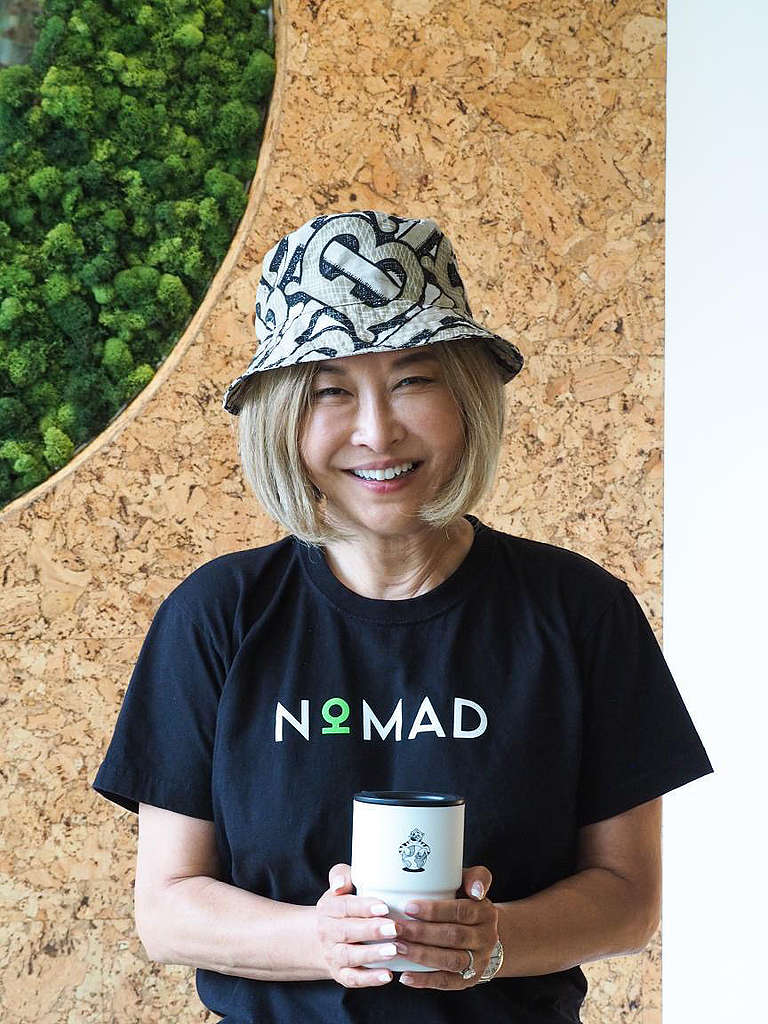
Nomad Cafe, located in the heart of North Vancouver’s residential Mosquito Creek neighbourhood, is the city’s first coffee shop to go without single-use cups. Equipped with a rinsing station at the bar, customers either bring their own cup, purchase one from the cafe or rent a cup with a $2 deposit that they get back when they return their cup. We spoke to the owner, Annette, to learn more about her single-use free practice.
You’re North Vancouver’s first cafe to end single-use coffee cups. Tell me a bit about your decision.
Previously I had two coffee shop experiences. The first was at Bean Around the World at Vancouver General Hospital. The second was at Bean on 5th and Lonsdale, in lower Lonsdale. But Nomad is my own coffee shop.
At the previous locations, it was challenging to recycle the single-use coffee cups because the inside is lined with plastic. So I noticed 300, 400 cups going into the trash every day. I thought, what should I do?
And then, during the pandemic, I became a grandmother. But I haven’t been able to see my grandson that much because of COVID. In six months, he only saw his mother and father and me. I was thinking, though, I immigrated here from Korea 15, 20 years ago because I love this beautiful country. And I want to give the same experiences, the same natural beauty I’ve enjoyed to my grandchild. So I thought about that. Even with little, little changes maybe I can play a small role. So I opened this coffee shop. It took a whole year because of the pandemic, but I did it.
What has the reception been like amongst your customers and community?
Many appreciate the initiative. It’s been very positive. I am a very small business, but it’s already had a bigger impact than I expected. All my neighbours know. [Nomad is located on the ground floor of a residential condo building]. And there’s an elementary school about two blocks away; the young kids that stop by are excited about the reusable cups we have. A few have said this is going to be their new habit. So that’s a little change in my area right now. And we only opened two months ago! I am a big believer that when you give to the community, the community gives back to you.
Philip Rossignol, Rethink BioClean, Regina
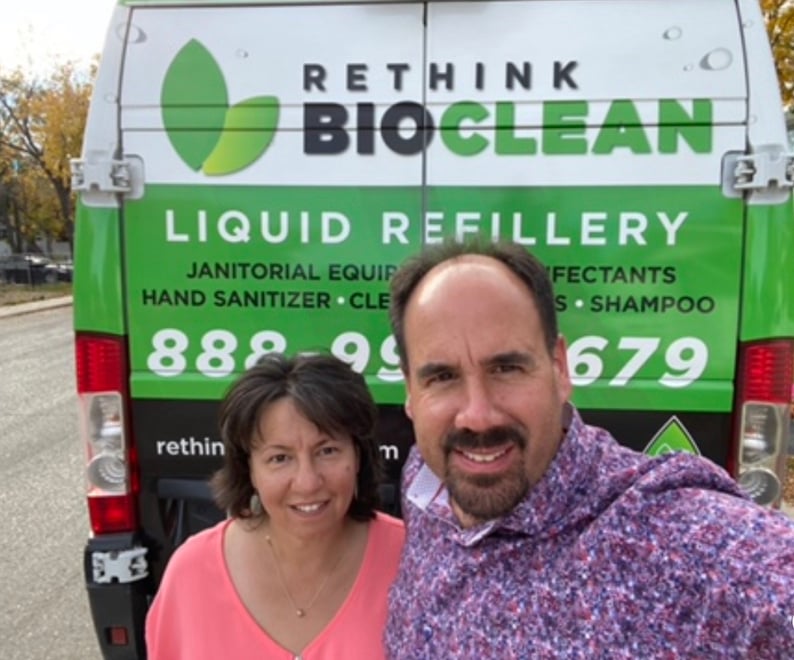
Rethink BioClean is a commercial refillery servicing restaurants, hotels and nursing homes with cleaning agents. They set up a tank system at their client’s locations and refill their tanks once a month. Launched by couple Dawn and Philip Rossignol, they’re based out of Regina but also serve Saskatoon and have a warehouse in Toronto. They currently have a team on the ground that’s launching in Quebec, Halifax, and a few other places in Ontario. We spoke with Philip.
Why did you launch Rethink BioClean?
During COVID, we were a supplier of disinfectants for schools and businesses. We set up a distribution network in Canada and were shipping pilots and pilots of this stuff.
But what happened in our mind was, there must be a better way to do this. We’re shipping out like crazy right now. So we came up with this system — we developed the software, set up in the van — and hired a chemist in 2020 to develop a product line to meet our customer’s needs but without harsh chemicals.
Then we launched our refillery model that year. And this year is going like crazy. We’re averaging three new accounts every week. And these accounts mostly bring about $1,000-3,000 per month.
What areas do you think would benefit from government support?
Because all the supply chain goes through tenders, there are no tender options for us. We cannot tender anything because we’re not included, and the government has not made any open door to people to deliver in bulk. To be honest, we’re the first in the world to launch this model at this level. And when I say at this level, we’re at the small level. The big level has been doing it. But we are a small commercial level, door to door. And locally-owned, non-franchise businesses are the number one clients we see. I say to myself, if the water boys can make money delivering water to each house, this should be a no brainer.
How do you see your business creating wider change in the zero waste movement/community?
We’re showing it can be done without costing more money. A lot of people, when they say they need to make changes, they always think it’s going to cost more money. This is not about, you have to buy an electric car. This is about changing your mentality about how you need to purchase. That’s all. We have a habit of throwing something on the shelves, and then throwing it into the trash can.
When I take a new account, we spend one full day at that account. There’s so much training that goes to this. They’re so used to doing their thing; we have to retrain their mind and all their employees how this system works and what benefits it has. And we encourage them.
Anastasia Kiku, Reusables.com, Metro Vancouver
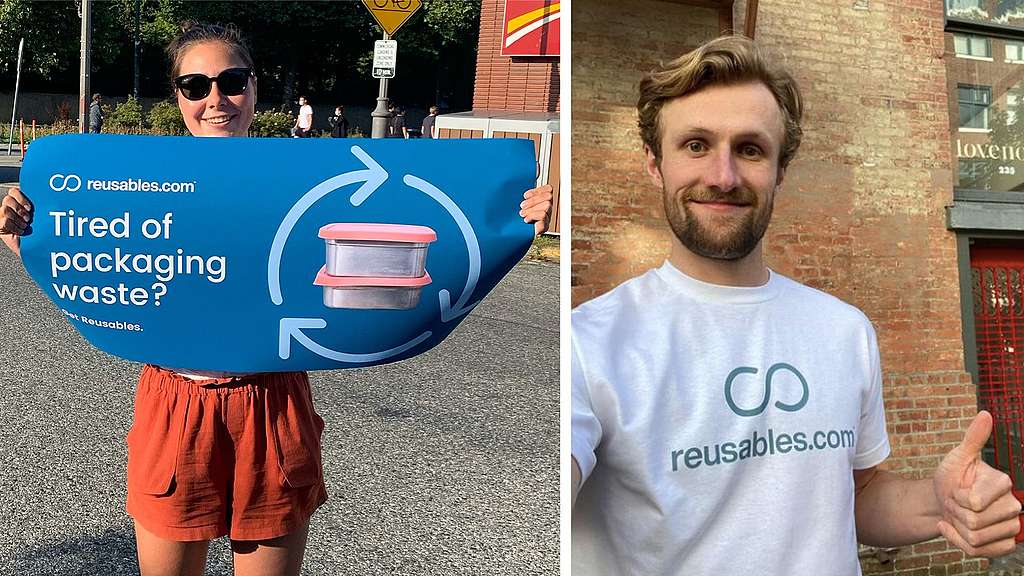
Reusables.com is a zero-waste packaging platform that supplies restaurants, cafes and grocery stores throughout Metro Vancouver with an inventory of reusable, stainless steel containers or cups. Some brands include Earls, JJ Bean, JamJar, IGA and Fresh St. Market. Customers at one of the 60 “Reuser” locations can download an app on their phone and become a member, which will link to a specific container they get at the location. They then have 14 days to return the container to any of the locations. Reusables was launched by Anastasia Kiku and Jason Hawkins last year. We spoke with Anastasia to learn more.
How did Reusables.com come about?
My cofounder Jason and I started thinking about this during high COVID times. We were seeing restaurants having to close their doors for dine in and transition 100% to takeout. And people who wanted to support their favourite restaurant were finding the only way to support was to order take out. And then you’re left all these containers to wash and put in the recycling, but recycling is really not solving the problem really well so far. It created piles and piles of packaging waste. So people were feeling guilty and we thought it’s not fair that they don’t have a different option. So we started to ask, can we create a better option?
So we did some market research and worked with UBC Master of Management students and some at Emily Carr just to understand consumer preferences. And then it became apparent the only thing left to do was try it out and see if it works in real life. So we thought we’d try out a really small pilot — four stores — and see if it works or not. And there were three main questions we asked early on: do people want this? Do restaurants want this? Is anyone willing to pay for this? And the answers were yes to all of them.
Are there areas that could benefit from more public support?
What really needs to happen is bold action. Everyone will need support in the transition. Food businesses will need resources and help to switch all their containers. And it’s important that restaurants switch to the best alternative supplier right away — reuse — instead of from problematic plastics, to less problematic plastics, to compostable, and never really getting to the best stage.
The government of Canada says a circular economy is the future we want to live in. So I think they have a big role to play to make sure a circular economy is enabled. Meaning support for individual businesses but also for infrastructure. For the past few hundred years, our infrastructure has been built for this linear economy. So a big opportunity is to rethink how to reshape that economy or build new infrastructure.
And circular economies work so much better on smaller scales. So not even city wide, but neighbourhood wide. We see an opportunity to create a bunch of smaller circular economies in communities within Vancouver and then have Vancouver as a bigger circular economy. But we see the importance of engaging the people who are really close in that community and uniting them with the businesses who are doing the right thing.
That’s it for this Plastic Free July! Want to help these small businesses and more help us secure a reuse, refill centred future? Tell Minister Guilbeault to support reuse and refill infrastructure!
Don’t miss part one in this blog series – Soaps and Staples. Read it now!

